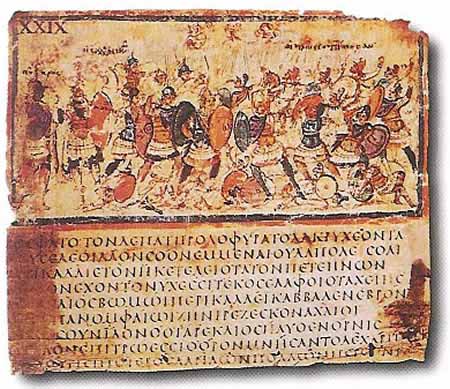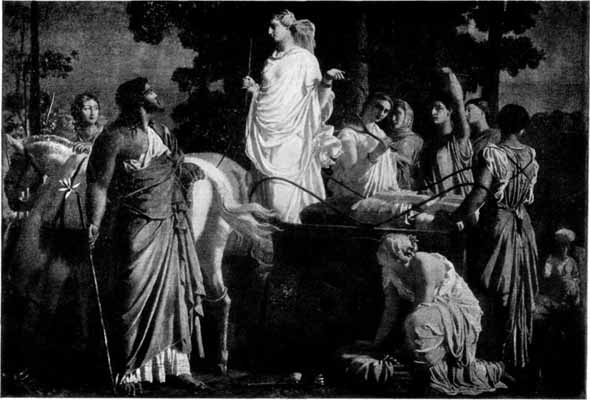



The Iliad narrates several weeks of action during the tenth and final year of the Trojan War, concentrating on the wrath of Achilles. It begins with the dispute between Achilles and Agamemnon, and ends with the funeral rites of Hector. Neither the background and early years of the war (Paris' abduction of Helen from King Menelaus), nor its end (the death of Achilles and the Trojan Horse), are directly narrated in the Iliad. The Iliad and the Odyssey are part of a larger cycle of epic poems of varying lengths and authors; only fragments survive of the other poems, however.
Both the gods Zeus and Poseidon desired the sea-nymph Thetis, but a prophecy made by Prometheus revealed that Thetis' son would be greater than his father. For this reason, both gods resisted Thetis and betrothed her to a mortal king, Peleus, so that her offspring would be no more than human. To Peleus and Thetis a son was born, named Achilles.
Hoping to protect him, when he was an infant his mother dipped him in the river Styx, making him invincible everywhere except the heel (the legendary Achilles' heel) by which she held him. Achilles would grow up to be the greatest of all mortal warriors.All of the gods were invited to Peleus' and Thetis' wedding, except Eris, or Discord. Insulted, she attended invisibly and cast down upon the table a golden apple on which were inscribed the words To the fairest (kallisti).
The apple was disputed over by Hera, Athena, and Aphrodite. None of the gods would venture an opinion favouring any one contender for fear of earning the enmity of the other two. Eventually, Zeus ordered the matter to be settled by Paris, the youngest prince of Troy, who was being raised as a shepherd in the plains nearby.
Athena tempted Paris with power in battle and wisdom, Hera offered him power, and Aphrodite offered him the most beautiful woman in the world. Paris eventually awarded the apple to Aphrodite.The most beautiful woman in the world was Helen, daughter of Leda by Zeus. Scores of men sought her hand. Her father was unwilling to choose any for fear the others would attack him; finally, at Odysseus' suggestion, he solved the problem by making all the suitors swear an oath to protect Helen and her future husband.
These suitors included Agamemnon, Ajax the Greater, Ajax the Lesser, Diomedes, Odysseus, Nestor, Idomeneus, and Philoctetes. Helen married Menelaus of Sparta; her sister Clytemnestra married his brother Agamemnon of Mycenae.
On a diplomatic mission to Sparta, Paris became enamoured of Helen, and she either eloped with or was abducted by Paris and went with him to Troy. In anger, Menelaus called upon Helen's past suitors to make good their oaths to attack Troy.
Eventually a force of a thousand ships marshalled by Menelaus' brother Agamemnon was gathered at Aulis, including all the above-named men and their own forces. A seer told them that the winds would not take them to Troy unless Agamemnon sacrificed his daughter Iphigenia. He did so, and the fleet set off.
They landed at Troy, eventually, where there ensued a siege of nine years, broken only intermittently by fighting until the tenth year.Shortly prior to the Iliad, Greek forces had raided a nearby town allied to Troy. Agamemnon had taken prisoner a girl, Chryseis, daughter of a local priest of Apollo. The priest begged the god to punish the Greeks, and a plague ravaged their army.
The Iliad focuses mainly on Achilles and his rage against king Agamemnon, the Greek commander-in-chief, who has taken an attractive slave and spoil of war Briseis from Achilles. Achilles, the greatest warrior of the age, follows the advice of his mother and withdraws from battle in revenge and the allied Achaean (Greek) armies nearly lose the war.In counterpoint to Achilles' pride and arrogance stands the Trojan prince Hector, son of King Priam, with a wife and child, who fights to defend his city and his family.
The death of Patroclus, Achilles' dearest friend or lover, at the hands of Hector, brings Achilles back to the war for revenge, and he slays Hector. Later Hector's father, King Priam, comes to Achilles disguised as a beggar to ransom his son's body back, and Achilles is moved to pity; the funeral of Hector ends the poem.
The poem is a poignant depiction of the tragedy and agony of friendship and family destroyed by battle. The first word of the Greek poem is; the main subject of the poem is the wrath of Achilles; the second word is "aeide", meaning "sing"; the poet is asking someone to sing; the third word is "thea", meaning "goddess"; the goddess here being the "Mousa" or "muse"; a literal translation of the first line would read "Wrath, sing goddess, of Peleus' son Achilles" or more intelligibly "Sing, goddess, the wrath of Peleus' son Achilles".
Book 1: Ten years into the war, Achilles and Agamemnon quarrel over a slave girl, Achilles withdraws from the war in anger
Book 2: Odysseus motivates the Greeks to keep fighting; Catalogue of Ships, Catalogue of Trojans and Allies
Book 3: Paris challenges Menelaus to single combat
Book 4: The truce is broken and battle begins
Book 5: Diomedes has an aristea and wounds Aphrodite and Ares
Book 6: Glaucus and Diomedes greet during a truce
Book 7: Hector battles Ajax
Book 8: The gods withdraw from the battle
Book 9: Agamemnon retreats: his overtures to Achilles are spurned
Book 10: Diomedes and Odysseus go on a spy mission
Book 11: Paris wounds Diomedes, and Achilles sends Patroclus on a mission
Book 12: The Greeks retreat to their camp and are besieged by the Trojans
Book 13: Poseidon motivates the Greeks
Book 14: Hera helps Poseidon assist the Greeks
Book 15: Zeus stops Poseidon from interfering
Book 16: Patroclus borrows Achilles' armor, enters battle, kills Sarpedon and then is killed by Hector
Book 17: The armies fight over the body and armor of Patroclus
Book 18: Achilles learns of the death of Patroclus and receives a new suit of armor
Book 19: Achilles reconciles with Agamemnon and enters battle
Book 20: The gods join the battle; Achilles tries to kill Aeneas
Book 21: Achilles fights with the river Scamander and encounters Hector in front of the Trojan gates
Book 22: Achilles kills Hector and drags his body back to the Greek camp
Book 23: Funeral games for Patroclus
Book 24: Achilles lets Priam have Hector's body back, and he is burned on a pyre
Although certain events subsequent to the funeral of Hector are foreshadowed in the Iliad, and there is a general sense that the Trojans are doomed, a detailed account of the fall of Troy is not set out by Homer. The following account comes from later Greek and Roman poetry and drama.
Achilles fights and kills the Amazon queen Penthesilea and the Aethiopean king Memnon. Very soon he gets killed on the battlefield by Paris, with a poisoned arrow to his vulnerable heel.
Ajax the Greater and Odysseus feuded over who would keep his armor. They submitted the issue to an impromptu court and Odysseus won. Ajax went mad with grief and slaughtered his livestock, believing they were the Greek commanders. Overcome with grief, he then killed himself.
The Amazons came to join the battle. Philoctetes, a crippled Greek who had been abandoned by the others along the journey, was recruited because the war could not, it was prophesied, be won without his bow.
Odysseus devised a plan to take the city. He had his men build a large, hollow wooden horse, then he and twenty others hid inside. The Greek ships withdrew out of sight of Troy, admitting defeat, and left behind them only the horse, purportedly as an offering to Poseidon for good winds on the return trip. The Trojans took this inside the city, and then feasted and celebrated in the belief the war was over.
At night the soldiers crept out and opened the gates to the other Greeks who had sailed back under cover of night. The city was sacked, and in some accounts burned for seven years. Priam was killed.
According to one tradition, Hector's wife Andromache threw his son Astyanax and herself from the ramparts to save them from slavery.
According to another, Astyanax was killed by Neoptolemus, son of Achilles, to ensure that Hector's son could not seek vengeance for his father's death against Achilles' son.
Andromache became Neoptolemus' concubine, later to marry Helenus, Hector's brother. A Roman tradition held that Aeneas escaped with his family and several hundred people, who after years of migration eventually founded Rome.
(This was used by Virgil in his Aeneid).
Odysseus' long journey home is narrated in Homer's Odyssey. Menelaus and Helen returned to Sparta to rule. Agamemnon took home as a slave the priestess Cassandra, who was gifted with prophecy but cursed never to be believed. When he returned home he was murdered by his wife Clytemnestra and her lover, Aegisthus. They in turn were killed by Agamemnon's son, Orestes, and his daughter, Elektra.
Technical features and translations
The poem is written in dactylic hexameter. The Iliad comprises roughly 16,000 lines of verse. Later Greeks divided it into twenty-four books, and this convention has lasted to the present day with little change.The Iliad has been translated into English for centuries. George Chapman did a translation in the 16th century which John Keats praised in his sonnet,
On First Looking into Chapman's Homer and Alexander Pope did another one in rhymed pentameter.There are five widely read modern English translations. Richmond Lattimore provides a translation that attempts to reproduce, line for line, the rhythm of the original poem.
Robert Fagles emphasizes contemporary English phrasing while maintaining faithfulness to the Greek. The translations of Stanley Lombardo and Robert Fitzgerald are known for their attention to Homer's imagery.
Lombardo's translation is generally the one most often recommended by classics scholars because of its faithfulness to the Greek and its modern vernacular style. A translation by Martin Hammond uses many influences, including Professor WB Stanford, Monro and Allen.
Published by Penguin Books, this is more of an educational translation, including as it does a full introduction, summary and index of names.
The Iliad as Oral Tradition
The Iliad and the Odyssey were considered by Greeks of the classical age and after as the most important works in Ancient Greek literature, and were the basis of Greek pedagogy in antiquity. As the center of the rhapsode's repertoire, their recitation was a central part of Greek religious festivals. The book would be spoken or sung all night (modern readings last around 20 hours), with audiences coming and going for parts they particularly enjoyed.
The written Iliad and the Odyssey are based on older, orally transmitted works and, consequently, are full of metaphors and similes which were used to communicate the stories to a mostly illiterate population in a manner they would understand. Specifically, the similes used in The Iliad can be divided into several categories: the descriptions of battles, people, and gods. Each type of simile aided understanding in Greek oral tradition and allowed the first listeners of the story to adequately picture what was being sung to them.

THE ODYSSEY